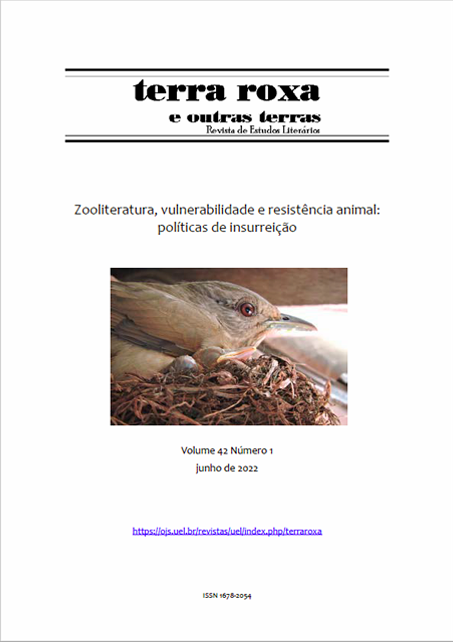Memories of a child dog. The inhumanity of the human in the narrative of Pablo Farrés
DOI:
https://doi.org/10.5433/1678-2054.2022v42p33-45Keywords:
dog, anthropotechnics, materialismAbstract
This article proposes a reading of the novel Literatura argentina (2011) by the Argentine Pablo Farrés. The main hypothesis holds that the animality in this narrative, articulated in the figure of the dog, establishes a relationship between low body materialism and schizophrenic hallucinatory perception. Argentine literature constitutes an exploration of human artifice in terms of memory of the species and questioning of individual subjectivity. Literatura argentina constitutes an exploration of human artifice in terms of memory of the species and questioning of individual subjectivity. From this perspective, schizophrenia is the non-individual, non-speciesist perception of the world that the living being inhabits. Literature, for Farrés, is the collective enunciation of a species that explores its non-human foundation, suggesting an evolutionism that goes back to the dog as a primordial ancestor.
Downloads
References
Aira, César. Prólogo. Osvaldo Lamborghini. Novelas y cuentos. Barcelona: Del Serbal, 1988. 7-16.
ALIZART, Mark. Perros. Buenos Aires. La Cebra, 2019.
ARCE, Rafael. Las hijas de Hegel. De la estatalidad fálica a la revolución de los géneros. Estudios de Teoría Literaria, Mar del Plata, v. 19, n. 19, p. 141 – 154, 2020. Disponível em: https://fh.mdp.edu.ar/revistas/index.php/etl/article/view/3397.
BATAILLE, Georges. El erotismo. Barcelona: Tusquets, 1997.
BATAILLE, Georges. El bajo materialismo y la gnosis. La conjuración sagrada. Ensayos 1929-1939. Buenos Aires: Adriana Hidalgo, 2008a. p. 56-63.
BATAILLE, Georges. La guerra y la filosofía de lo sagrado. La felicidad, el erotismo y la literatura. Ensayos 1944-1961. Buenos Aires: Adriana Hidalgo, 2008b. p. 157-171.
BUTLER, Samuel. Vida y hábito. La evolución más acá de la frontera entre lo natural y lo humano. Buenos Aires: Cáctus, 2013.
CRAGNOLINI, Mónica B. Moradas nietzscheanas. Del sí mismo, del otro y del “entre”. Buenos Aires: La Cebra, 2016.
FARRÉS, Pablo. Literatura argentina. Río Tercero: Nudista, 2020.
FLEISNER, Paula. Comunidades posthumanistas: dos ejemplos de vínculos no especistas entre canes y animales humanos en la literatura y el cine latinoamericanos. Alea, Rio de Janeiro, v. 20, n.2, p. 36-52, 2018. Disponível em: https://doi.org/10.1590/1517-106X/20182023652. DOI: https://doi.org/10.1590/1517-106x/20182023652
GENOVESE, Omar. Prólogo. Pablo Farrés. Mi pequeña guerra inútil. Río Tercero: Nudista, 2017.
GIORDANO, Alberto. El juego de la crítica. Apuntes en un cuaderno. Boletín del Centro de Estudios de Teoría y Crítica Literaria, Rosario, n. 20, p. 7-27, 2020. Disponível em: https://ri.conicet.gov.ar/handle/11336/146786
HEGEL, Georg Whilhelm Friedrich. Ciencia de la lógica. Buenos Aires: Las Cuarenta, 2013.
JIMÉNEZ MORATO, Antonio. El ilustre desconocido Osvaldo Lamborghini. AAVV El sexo que habla. Osvaldo Lamborghini. Barcelona: MACBA, 2014. p. 49-106.
KOHAN, Martín. A dónde volver. Itinerarios, Warszawa, 32, p. 9-21, 2020. Disponível em: https://itinerarios.uw.edu.pl/resources/html/article/details?id=222508. DOI: 10.7311/ITINERARIOS.32.2020.01. DOI: https://doi.org/10.7311/ITINERARIOS.32.2020.01
LAMBORGHINI, Osvaldo. Las hijas de Hegel. Novelas y cuentos I. Buenos Aires: Mondadori, 2013.
LUDUEÑA ROMANDINI, Fabián. La comunidad de los espectros I. Antropotecnia. Buenos Aires: Miño & Dávila, 2010.
LUDUEÑA ROMANDINI, Fabián. Principios de espectrología. La comunidad de los espectros II. Buenos Aires: Miño & Dávila, 2016.
MARTINEZ, Luciana. La doble rendija. Autofiguraciones científicas de la literatura en el Río de la Plata. Buenos Aires: Prometeo, 2019.
NIETZSCHE, Friedrich. La genealogía de la moral. Madrid: Gredos, 2011.
PAULS, Alan. El factor Borges. Barcelona: Anagrama, 2004.
STRAFACCE, Ricardo. Osvaldo Lamborghini, una biografía. Buenos Aires: Mansalva, 2008.
YELIN, Julieta. Biopoéticas para las biopolíticas: el pensamiento literario latinoamericano ante la cuestión animal. Pittsburgh: Latin America Research Commons, 2020. Disponível em: https://www.larcommons.net/site/books/m/10.25154/book4/. DOI: https://doi.org/10.25154/book4
Downloads
Published
How to Cite
Issue
Section
License
Copyright (c) 2022 Terra Roxa e Outras Terras: Revista de Estudos Literários

This work is licensed under a Creative Commons Attribution-NonCommercial 4.0 International License.
Authors who publish in this journal agree to the following terms:
a) The authors retain the copyright and grant the journal the right of first publication, the work being simultaneously licensed under the Creative Commons Attribution-NonCommercial 4.0 International License, allowing the sharing of the work with acknowledgment of the authorship of the work and initial publication in this journal.
b) Authors are authorized to assume additional contracts separately, for non-exclusive distribution of the version of the work published in this journal (eg, publish in an institutional repository or as a book chapter), with acknowledgment of authorship and initial publication in this journal.
c) Authors are allowed and encouraged to publish and distribute their work online (e.g. in institutional repositories or on their personal page) after the editorial process, as this can generate productive changes as well as increase impact and citation of the published work (See The Effect of Open Access).
d) The authors of the approved works authorize the journal to, after publication, transfer their content for reproduction in content indexers, virtual libraries and the like.
e) The authors assume that the texts submitted for publication are of their original creation, taking full responsibility for their content in case of any objection by third parties.



















